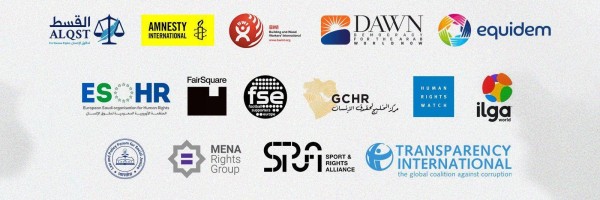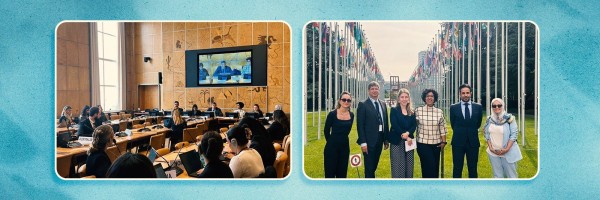The great irony of the Riyadh Comedy Festival currently taking place in the Saudi capital is that its hosts, while welcoming high-profile international comedians and satirists, continue to suppress peaceful free speech and satirical comment among their country’s own journalists, bloggers and ordinary citizens. The festival, which runs from 26 September to 9 October 2025, will coincide with the seven-year anniversary of the state-sanctioned killing of journalist Jamal Khashoggi on 2 October 2018, while countless individuals remain arbitrarily imprisoned or barred from travelling abroad for peacefully exercising their basic right to free expression. ALQST calls on participating comedians to use this platform to raise individual cases of concern, including Saudis arbitrarily detained and those at risk of execution.
The glittering two-week event, a first for Riyadh, features a lineup of internationally-renowned stand-up comedians including Americans Dave Chappelle, and Aziz Ansari and co-headliner Jimmy Carr from the UK, who are reportedly receiving hundreds of thousands of dollars to take part. Yet there is a stark contrast between the glitz of Crown Prince Mohammed bin Salman’s massive investment in sports and entertainment, as part of his Vision 2030 transformation plan, and the ongoing widespread repression of the Saudi people.
Stand-up comedy is rooted in free speech and satire, and several comedians not coming to Riyadh, including Zach Woods and Marc Maron, have spoken out about the rights abuses in Saudi Arabia. Tim Dillon, meanwhile, was reportedly fired from the festival after making critical comments on his podcast. And on September 27, comedian Atsuko Okatsuka—who also declined to participate—shared a screenshot detailing censorship restrictions imposed on performers, including a ban on material that defames the country's leaders.
The Saudi authorities’ record on free speech and human rights is no joking matter, though. Humanitarian worker Abdulrahman al-Sadhan, for example, was forcibly disappeared and sentenced to 20 years in prison for peaceful satirical content on X (previously Twitter). And just a few months ago journalist Turki al-Jasser was executed on vague charges of terrorism, treason and endangering national security because of articles published online in which he tackled sensitive topics including women’s rights, corruption and the plight of the Palestinians.
Saudi Arabia has executed at least 285 people so far in 2025 (as of 30 September), including nearly 200 for non-violent drug offences, mainly by foreign nationals. In another deeply disturbing development, juvenile defendant Jalal Labab was executed in August, raising serious fears for at least six other child offenders currently on death row in violation of international law.
Last week ALQST reached out to several comedians scheduled to take part in the Riyadh festival, or their representatives, but we have received no responses to date.
ALQST’s Monitoring and Advocacy Officer Nadyeen Abdulaziz said: “Silence in the face of injustice is complicity. These comedians are celebrated for pushing boundaries and speaking truth to power. We urge them to embody those principles – not abandon them – when it matters most.”




